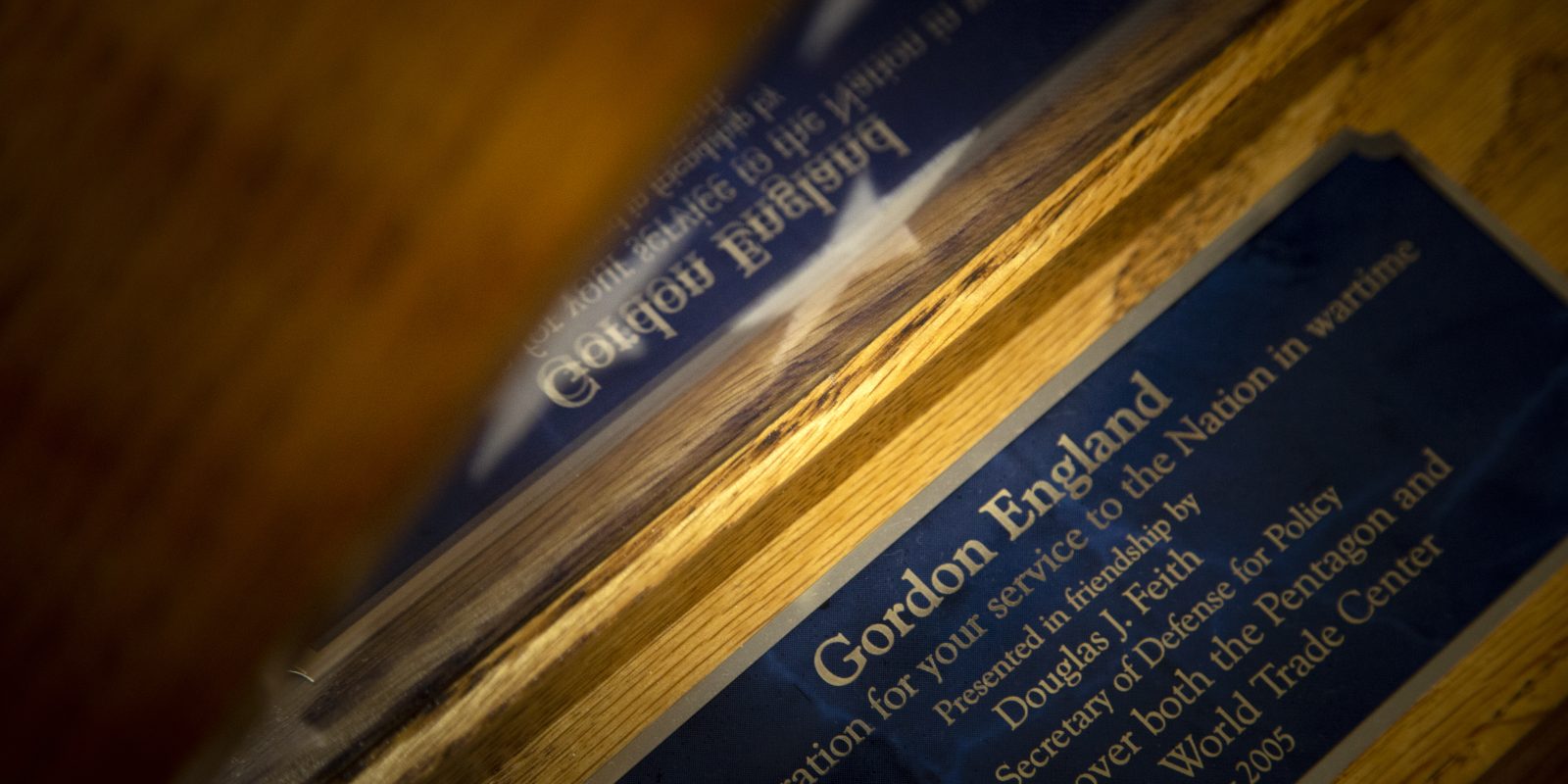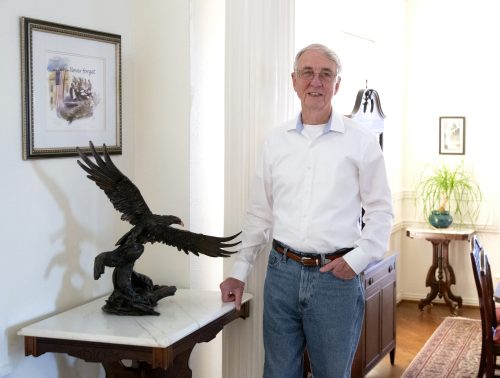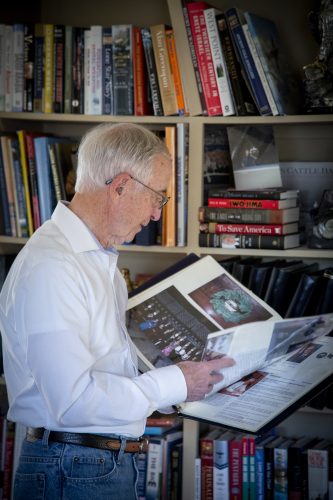
Photo by Joyce Marshall
Engineering a Career of Service
Gordon England modeled leadership in industry and at the Pentagon.
Gordon England ’75 MBA, an engineer and executive who later answered the call to help lead the nation after the attack on Sept. 11, 2001, has resume highlights ranging from serving as president of General Dynamics to serving the U.S. as deputy secretary of defense.
“None of my success was planned,” England said. “In fact, I tell students to not plan a career; it doesn’t work that way. There’s a lot of happenstances in life, and you’ll be disappointed if your plans don’t happen.”
England said that early on, he committed himself to a relentless work ethic, treating people right and keeping his priorities in line. Pursuing those three goals has made him a successful leader, according to former colleagues, who include decorated military officers.
“Gordon is a true believer in connecting with people,” retired Navy Vice Adm. Peter Daly said. “He understands the motivation of the people that he leads. His ability to gauge the full spectrum of those he led truly stands out to me.”
Lt. Gen. John Wissler, a three-star commander who served in the Marine Corps, considers England a mentor and friend.
“When you think about the sacrifices that he made … serving eight difficult years in the Pentagon and doing unbelievably challenging jobs, from establishing the Department of Homeland Security as the first deputy secretary to fundamentally restructuring the way money was spent in the office of the secretary of defense, his contributions were monumental. His sacrifice of personal financial resources, not to mention his time and commitment to family, was immense,” Wissler said. “And yet he did it because he believed in serving the nation. He embodies everything it means to be a selfless, servant-leader character.”
Trusted with ‘really hard stuff’
England served as the 72nd secretary of the Navy from May 2001 through January 2003. He then served as the nation’s first deputy secretary of Homeland Security through October 2003. He was called back to the role of secretary of the Navy, where he served through June 2005. That was immediately followed by an appointment to serve as the 29th deputy secretary of defense from June 2005 to February 2009.

Gordon England served as the 29th Deputy Secretary of Defense and the 72nd and 73rd Secretary of the Navy. Photo by Joyce Marshall
England served first under Secretary of Defense Donald Rumsfeld and then under Secretary of Defense Robert Gates, who acknowledges England’s contributions in his 2014 book Duty: Memoirs of a Secretary at War.
When Gates replaced Rumsfeld, he immediately faced the public relations challenge of repairing the Defense Department’s relationships with Congress, other agencies and the media. An hour after he was sworn in on Dec. 18, 2006, Gates held his first staff meeting with senior civilian leadership and the Joint Chiefs of Staff.
“My priorities are clear: Iraq, Afghanistan, the war on terrorism, and transformation,” Gates said, according to his account of the meeting published in his book. “I want to continue the division of labor with Deputy Secretary (Gordon) England that existed under Secretary Rumsfeld — with all the really hard stuff going to Gordon! He and I will be joined at the hip.”
Prior to joining the administration of President George W. Bush, England helped lead General Dynamics Corp., with roles ranging from director of avionics to president. His business career spanned four decades as an engineer and senior executive.
Wissler said England often would share leadership lessons from his days working at General Dynamics.
“When Gordon took over the plant in Fort Worth, I want to say it took nearly 42 months to build an F-16 fighter jet. The number is unimportant, except in its magnitude. So when Gordon arrived there, he decided that was too long to build the F-16 and they needed to shorten the time in order to get a product to the customer faster yet maintain quality,” Wissler said. “He started a process where he went to virtually everybody in the plant, from the security folks to the office folks, to the engineers, to the artisans on the floor who were responsible for making the jets. He talked to them all, and eventually asked them one key question: ‘What’s the one thing you would do differently to make yourself more effective?’ ”
Wissler said England collected those responses, did some additional probing and research, and created a plan to produce the F-16 in 28 months. When he was reassigned by General Dynamics to run another large program, he had cut the time to make an F-16 to 29 months, bringing the jet to the customer faster and under budget.
Engineer to executive
England grew up in Baltimore’s inner city with parents who never attended high school; they both went to work after the eighth grade. After England graduated from high school, he was accepted into a Westinghouse work-scholarship program that gave him a leg up with his engineering studies.
“People often ask how I ever got into this profession. Well, when I was in high school, there was still surplus equipment around from World War II. So I became a ham radio operator. I built my own receivers, transmitters, antennas. As a ham operator, I could communicate via Morse code with others around the world,” England said. “Ultimately, I became an electrical engineer, but I expect it was this exposure in high school that helped.”
England graduated with a Bachelor of Science degree in electrical engineering from the University of Maryland in 1961.
His fascination with tinkering, coupled with his work experience at Westinghouse after high school, allowed him to enter the workforce with more experience than others in his peer group. He began his career at Honeywell, where he was an engineer on the Project Gemini space program, which was NASA’s second human spaceflight program.
“My objective in life was to be a senior engineer,” England said. “I told my wife, with that job we would be able to buy a modest house, have a car, raise a couple of kids and go on vacation.”
He accepted an offer to work with General Dynamics in Fort Worth. In 1975 he earned a master’s in business administration from TCU’s Neeley School of Business and subsequently earned distinguished alumnus recognition in 2005 for his success after leaving TCU.
“When I started moving into program management, there were a lot of things I realized I didn’t know. And that’s when I decided to go to TCU to get an MBA,” England said. “I wanted to take specific courses that I needed for the job I was evolving into, which was managing engineering, rather than doing engineering.”
Serving and leading

“None of my success was planned,” Gordon England says. “In fact, I tell students to not plan a career; it doesn’t work that way. There’s a lot of happenstances in life, and you’ll be disappointed if your plans don’t happen.” Photo by Joyce Marshall
England has volunteered in a variety of civic, charitable and government organizations, including working as a city councilman in Benbrook, Texas, from 1980 to 1985 after moving his family to the city to work at General Dynamics.
England was elected to the National Academy of Engineering in 2012 for making advancements in digital avionics for aircraft, land and naval platforms. He later was named chairman of the nonprofit peer-elected organization, which provides independent advice on matters involving engineering and technology.
“He’s just a delight to work with,” said John Anderson, president of the National Academy of Engineering who served with England from 2019 to 2020. “He’s very good with people and very smart. He has ideas and thoughts about how things should be done, but he doesn’t expect you to fall in line always. I can see why he was so successful.”
England admits that not every government leadership decision worked out perfectly; some decisions have come with political blowback. However, he’s at peace with the choices he’s made.
“Many decisions [in the Department of Defense] are so massively complex and there is no right or wrong; there’s just better and worse in every decision you make,” he said. “There’s always a downside, but what you do as a leader is you find a decision that has far more upside than downside.”
England attributes his ability to handle those decisions and high-pressure roles to his perspective on what matters most.
“Careers can be satisfying and rewarding, but that’s not what makes you happy,” England said. “What makes you happy is family, friends, giving and sharing. That’s the happy part of life. You should never ever sacrifice the happy part of your life for your career.”

Your comments are welcome
1 Comment
I remember Gordon back to when he was the manager of avionics and fire-control groups. There was not enough room in the main office building, so we were set up in the parking lot in temporary buildings. Gordon had a modest office, and his door was always open. Sometimes he would call me as I walked past. Once, he sent me to the then tank division in Detroit to share some avionics knowledge when they were upgrading the tank crew stations. After I retired (I am 95), I wanted him to be a speaker for our veterans Post in Fort Worth. I phoned him in Washington. He said to wait until he got free of his duties there and to call him in the next year. I did and he came and spoke to us during Memorial Day. Oh, I am also a TCU guy.
Related reading:
Alumni
Flying High
Amy Hoover earned her wings and teaches others to soar.
Alumni, Features
Veterans Share Their Experiences in New Book
The collection of personal accounts covers military life from World War II to the present day.